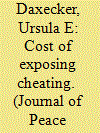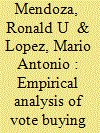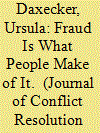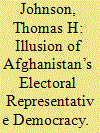|
|
|
Sort Order |
|
|
|
Items / Page
|
|
|
|
|
|
|
| Srl | Item |
| 1 |
ID:
117015


|
|
|
|
|
| Publication |
2012.
|
| Summary/Abstract |
This article investigates the relationship between international election observation, election fraud, and post-election violence. While international electoral missions could in principle mitigate the potential for violence by deterring election fraud, the ability of international observers to detect manipulation may in fact induce violent uprisings. Serious irregularities documented by international observers provide credible information on election quality, which draws attention to election outcomes and alleviates coordination problems faced by opposition parties and society. When elections are manipulated to deny citizens an opportunity for peaceful contestation and international observers publicize such manipulation, violent interactions between incumbents, opposition parties, and citizens can ensue. Consequently, the author expects that fraudulent elections monitored by international organizations will have an increased potential for subsequent violence. This expectation is evaluated empirically in an analysis of post-election conflict events for African elections in the 1997-2009 period. Using original data on electoral manipulation and reputable international election observation missions, findings show that the presence of election fraud and international observers increases the likelihood of post-election violence. Matching methods are employed to account for the possibility that international observers' decisions to monitor elections are endogenous to the occurrence of violence in the electoral process. Results for matched samples confirm the findings in the unmatched sample. A variety of robustness tests show that the results are not influenced by the operationalization of independent variables and influential observations.
|
|
|
|
|
|
|
|
|
|
|
|
|
|
|
|
| 2 |
ID:
158205


|
|
|
|
|
| Summary/Abstract |
Recent literature suggests that the poor are more likely to be targeted for vote buying and to sell their votes. However, there is limited empirical analysis on the patterns of vote buying among low-income voters. This paper attempts to fill this gap using a survey conducted in Metro Manila, Philippines after the 2016 elections. Data analysis shows that vote buying among the poor is indeed very common, but the incidence varies depending on the vote buying type. The most prevalent form uses more benign goods such as food and clothing, but offers of money is still reported by more than a quarter of respondents. Different vote-buying types also have different correlates, including some socio-economic factors, suggesting that it is a finely targeted activity. In addition, money vote buying is predominant in tight elections, but buying votes using non-monetary offers is more common when there is a clear winner even before the election. Most of those who were offered accepted the goods or money, but only about two-thirds voted for the candidate. In addition, evidence suggests that the good or money is not the deciding factor in voting for the candidate. This supports the premise that vote buying is just part of a bigger effort by politicians to build clientelism and patronage among his/her constituencies. Dependency and loyalty is merely punctuated by election-related transfers, rather than an effort to completely change votes.
|
|
|
|
|
|
|
|
|
|
|
|
|
|
|
|
| 3 |
ID:
169073


|
|
|
|
|
| Summary/Abstract |
Why do fraudulent elections encourage protesting? Scholars suggest that information about fraud shapes individuals’ beliefs and propensity to protest. Yet these accounts neglect the complexity of opinion formation and have not been tested at the individual level. We distinguish between the mobilizing effects of actual incidents of election fraud and individuals’ subjective perceptions of fraud. While rational updating models would imply that both measures similarly affect mobilization, we argue that subjective fraud perceptions are more consistent predictors of protesting, also being shaped by attitudes, information, and community networks. Our empirical analysis uses geo-referenced individual-level data on fraud events, fraud perception, and protesting from the 2007 Nigerian elections. Our analysis yields two main findings: proximity to reported fraud has no effect on protesting and citizens perceiving elections as fraudulent are consistently more likely to protest, and more so if embedded in community networks.
|
|
|
|
|
|
|
|
|
|
|
|
|
|
|
|
| 4 |
ID:
168260


|
|
|
|
|
| Summary/Abstract |
This article is the latest in a series of published articles systematically examining Afghan Presidential and legislative elections. Structural problems including fraud, ethno-linguistic block voting, and the Single Non-Transferable Vote have had significant impacts on the development of Afghan democratic elections. The challenge now facing the current Afghan government and future elections is the daunting task of uniting the Afghan people while not repeating the electoral mistakes of the past. The tricky balancing act of fostering an overarching national identity without being perceived as privileging particular identities requires strong leadership and a willingness to challenge traditional ethnic, linguistic, and religious norms when need be. Karzai and Ghani Administrations have seriously failed relative to this dynamic.
|
|
|
|
|
|
|
|
|
|
|
|
|
|
|
|
|
|
|
|
|